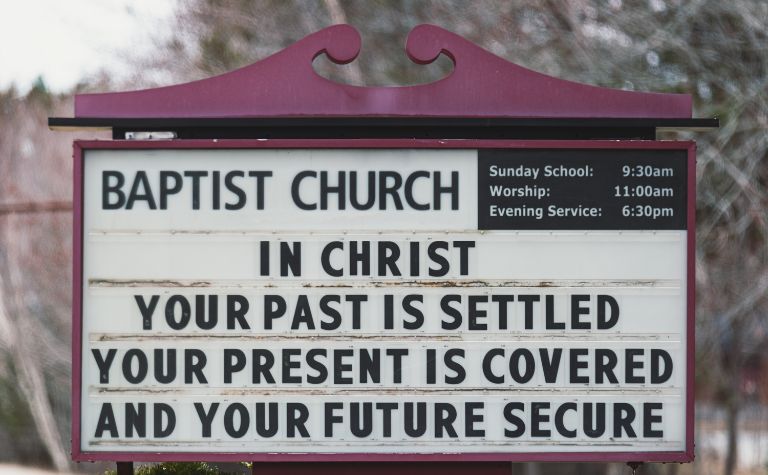The veneration of saints is an important practice in certain branches of the Christian tradition, like Catholicism. To some churchgoers, regularly engaging with faithful men and women who lived in previous centuries is as common as Bible reading and praying to God. Yet not all Christians revere the saints as Catholicism does.
Baptists don’t venerate the saints like Catholicism teaches and practices. Baptists study the lives of former Christians to learn from their faithfulness, find encouragement in their devotion, and grow by reading their writings, but they don’t pray to them, ask them for help, or solicit their blessings.
What do Baptists believe about the “saints” mentioned in the New Testament? How does this compare with what Catholicism teaches and practices about sainthood? Keep reading to learn more.
Also, see What’s the Difference Between Baptist and Foursquare? to learn more.

Saints in Baptist and Catholic Theology Compared
Because Baptists and Catholics both use the word “saints” in their theology and liturgy, it’s important to understand that there are big differences in what they mean when they use the term.
What Baptists imply when they talk about “saints” isn’t the same as what Catholics imply when they refer to the “saints” and vice versa.
- “Saints” in Baptist theology refers to believers. The Greek word translated “saints” in many popular English translations means “having been sanctified” and refers to anyone who has made a decision to faithfully follow Jesus Christ. Though every believer is worthy of respect, and those who have made a significant impact in the world for Christ should be honored, they aren’t to be exalted and revered as taught and practiced in Catholicism.
- “Saints” in Catholic theology refers to believers in previous centuries that are worthy of exaltation and reverence. The designation “saint” identifies uniquely devoted and influential Christians who deserve an esteemed status within the Church. (Also, see Baptist vs. Catholic: What’s the Difference?)
| “Saints” | Baptists | Catholicism |
|---|---|---|
| Are they believers? | yes | yes |
| Are they holy and consecrated? | yes | yes |
| Have certain believers lived extraordinarily exemplary lives? | yes | yes |
| Should such believers be canonized? | no | yes |
| Should such a believer be petitioned through the prayers of believers today? | no | yes |
| Does engaging with saints replace engagement with God? | no | it shouldn’t |
| Is attempted engagement with the deceased paganism? | some say yes | not the way the church teaches and practices it |
| Should images and relics of saints be used in worship? | no | they can be |
Who Are the “Saints” According to Baptists?
Do Baptists believe in the saints? Yes, according to their understanding of the term. Baptists argue that a person’s understanding of the term should come from Scripture alone.
Moreover, what Scripture teaches about saints should also act as a boundary. Beliefs and practices that extend beyond biblical boundaries, such as those found in Catholicism, are illegitimate. (Also see Do Baptists Believe in Mortal Sin?)
Saints in the New Testament
In the Apostle Paul’s first letter to the Corinthians, he addresses the recipients as saints: “To the church of God that is in Corinth, to those sanctified in Christ Jesus, called to be saints together with all those who in every place call upon the name of our Lord Jesus Christ, both their Lord and ours” (1 Corinthians 1:2, ESV, emphasis added)
The word translated as “saints” is hegiasmenois, which refers to those who have been sanctified by faith. The same word is used in Acts 20:32 and 26:18 and is often translated in the same way as 1 Corinthians 1:2 in popular English translations.
Baptists argue that the term refers to all believers, not a certain kind of exalted leader who should be set apart from the rest and revered. (Also see Here’s What Baptists Believe About Salvation)
What “Saints” Means to Baptists
According to Baptist theology, taking into account all the references to “saints” in the Old and New Testament leads to the following observations:
- Saints are those who are in right relationship with Christ: It doesn’t matter if the person is clergy or not, famous or not, or if they have made a notable impact on the Church. Any faithful follower of Christ, because they are in right relationship with Christ, can be called a saint.
- Saints are those who pursue holiness: Any faithful follower of Christ committed to becoming more holy and Christ-like can be rightfully called a saint, according to the Baptist understanding of Scripture.

What Do Catholics Believe About the Saints?
When Catholic doctrine and teaching refer to “saints,” it often implies the exalted believers that the church has canonized.
Through an elaborate process of analysis and research, the church may declare a man or woman a saint, which members of the church are to recognize.
“Sainthood,” as it’s referred to, isn’t simply a historical designation. Saints, according to Catholic theology, can impact the lives of Christians today in meaningful and relationship ways.
“In the Roman Catholic tradition, the saints are persons who have been specially graced by God’s Spirit to live in an exemplary manner and to perform special feats. Catholic piety includes veneration of, and prayer to, the saints.” [1]
A Catholic’s devotion to certain saints varies person by person. Some acknowledge a saint’s exalted status and petition him or her to pray for them and help them. Other Catholics exhibit a devotion that is more intense and involves:
- Doing pilgrimage to locations associated with certain saints
- Making offerings to certain saints
- Venerating the relics of certain saints, such as hair, fingernail clippings, and bones
What Is the Invocation of Saints?
The Invocation of Saints refers to people on Earth calling upon Christians in heaven for help. Though most Catholic theologians acknowledge that the biblical basis for this practice is lacking, they argue that verses like Romans 15:30 and James 5:16, which speak of the importance of believers praying for one another, allude to it:
- “I appeal to you, brothers, by our Lord Jesus Christ and by the love of the Spirit, to strive together with me in your prayers to God on my behalf.” (Romans 15:30, ESV)
- “Therefore, confess your sins to one another and pray for one another, that you may be healed. The prayer of a righteous person has great power as it is working.” (James 5:16, ESV)
Catholic theology argues that Christians who have died physically and are alive in heaven are part of the Church and can partake in applying the verses above. There is no distinction between asking a believer on Earth for prayer and a believer in heaven.
The Apostle Paul encourages Christians to bear one another’s burdens (Gal. 6:2). Catholic theology asks, “Who better to bear our burdens than believers who have overcome the trials and suffering we now face?”
The faithful believers of the past have unique insight and knowledge about life’s trials and tribulations. They know firsthand people’s current needs and desire to intercede for Christians on Earth. According to Catholic teaching, prayers to saints should never replace prayers to God. (Also see Can a Baptist Deacon Marry a Couple?)

How Did Catholic Sainthood Start?
Church historians believe that the early Christians’ honor of martyrs may have evolved into the veneration of the saints. It’s known that early Christians gathered at the graves of those killed for their faith and conducted worship services at such locations.
Other believers, who weren’t martyred, but whose impact was considered just as valuable, started to get special recognition as well.
The former belongings of such faithful believers, like an item of clothing or a comb, were revered. And to some, very personal items like a lock of hair had special value. (Also see Do Baptists Believe in Cremation?)
Do Baptists Consider the Doctrine Blasphemous?
Some do. Others don’t use the word “blasphemous,” but they believe the practice is misguided and potentially dangerous. Strong disagreement with the doctrine didn’t begin with the Protestant Reformation in the 16th century, as is sometimes assumed.
The Waldensians are an example of a pre-Reformation group that opposed the practice as early as the 12th century, charging the Catholic church with practicing paganism.
References:
[1] Pocket Dictionary of Theological Terms. p. 104-105. Emphasis added.
[2] Source
[3] Source
Related Questions
Baptist and evangelical churches are numerous in America, and the influence of each tradition has also spread to different continents and countries. As a result, many people have heard the terms...
Baptist denominations and churches, which date to the 17th century, comprise one of the largest branches of Christianity in the Western world. While Christian churches in Baptist networks and...
